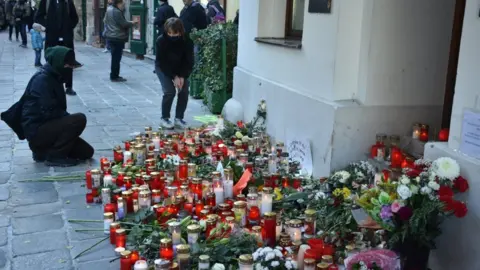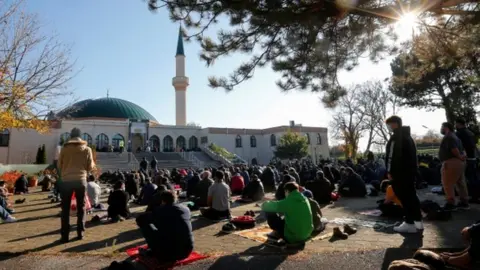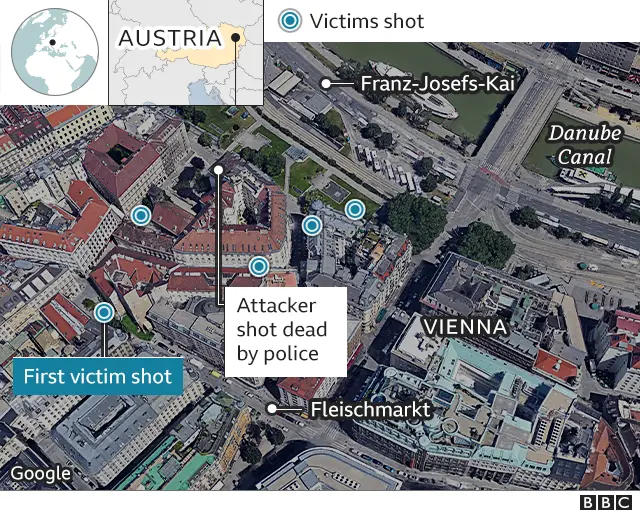Vienna shooting: Anti-terror chief suspended over intelligence bungle
 Getty Images
Getty ImagesAustrian officials have revealed new intelligence failings ahead of the murder of four people in Vienna on Monday night, prompting the city's anti-terror chief to step aside.
Erich Zwettler was being suspended at his own request, police said.
It has already emerged the Austrians were told in July that the suspect had tried to buy ammunition in Slovakia.
Now, the Austrians have admitted the gunman met two people from Germany who were already under observation.
Interior Minister Karl Nehammer has spoken of "obvious, and in our view intolerable mistakes".
In a further development, a mosque and a mosque association frequented by the 20-year-old have been closed, which Integration Minister Susanne Raab said had contributed to his radicalisation.
He had repeatedly visited the mosques in the suburbs of Ottakring and Meidling. The Ottakring mosque association was notorious for its links to militant Islamists: a preacher there is said to have led a German-speaking brigade to Syria before being killed in a drone strike.
 Reuters
ReutersMs Raab said the aim of terror was to drive a wedge in society between Muslims and non-Muslims.
What failings have emerged?
Soon after the fatal shooting of two men and two women in the centre of Vienna, it became clear that the heavily armed gunman had been released early from a 22-month jail term for trying to join Islamic State jihadists in Syria.
The interior minister claimed he had fooled the organisers of a deradicalisation programme, although they have denied that.


Then Slovak police revealed that they had told their Austrian counterparts that the gunman had tried to buy ammunition in July. Austria's BVT domestic intelligence agency appears to have mishandled the case, although officials had trouble identifying the suspect.
On Friday, German police searched the homes of four men in Kassel, Osnabrück and the Pinneberg area near Hamburg, over suspected links with the gunman, identified by Austrian authorities as an "Islamist terrorist" called Kujtim Fejzulai.
Although they were not seen as suspects in the shooting itself, two of the four are thought to have met the attacker in Vienna in July and were described in Germany as "part of the Islamist scene".
Both men met him several times and one of them stayed at his home, German news agency DPA reported. Another of the men had stayed with the gunman's family in Vienna and tried unsuccessfully to travel to Syria, it is alleged.
German Interior Minister Horst Seehofer had already highlighted a German connection involving people who were being "monitored around the clock".
Vienna police chief Gerhard Pürstl said the visitors from Germany were watched by Vienna's LVT domestic intelligence and counter-terror agency on behalf of their German counterparts, but no action had been taken.
Those meetings and the failed attempt to buy ammunition "could have led to a different outcome in assessing the danger posed by the perpetrator", the police chief said.
Was attack prompted by planned Vienna raids?
Austria's interior minister had earlier refused to comment on reports suggesting that security forces had been hours away from conducting a major anti-terror operation when the shooting began.
Operation "Ramses" was due to start at 03:00 on Tuesday, with raids on the homes of people known to the gunman, the reports say. But information about the searches was reportedly passed on by an interpreter.
At 20:00 on Monday, the gunman went on the rampage for nine minutes in the centre of Vienna, opening fire on people at bars and restaurants in the hours before they were about to close under new coronavirus restrictions.
The attack, in six separate places, left four people dead and 23 others wounded, and it was finally brought to an end when the gunman was shot dead.
A series of arrests were made in Vienna and elsewhere after the shooting. Eight people aged 16 to 24 were remanded in custody by a court in the Austrian capital on Friday. Another two people have been detained in neighbouring Switzerland.
